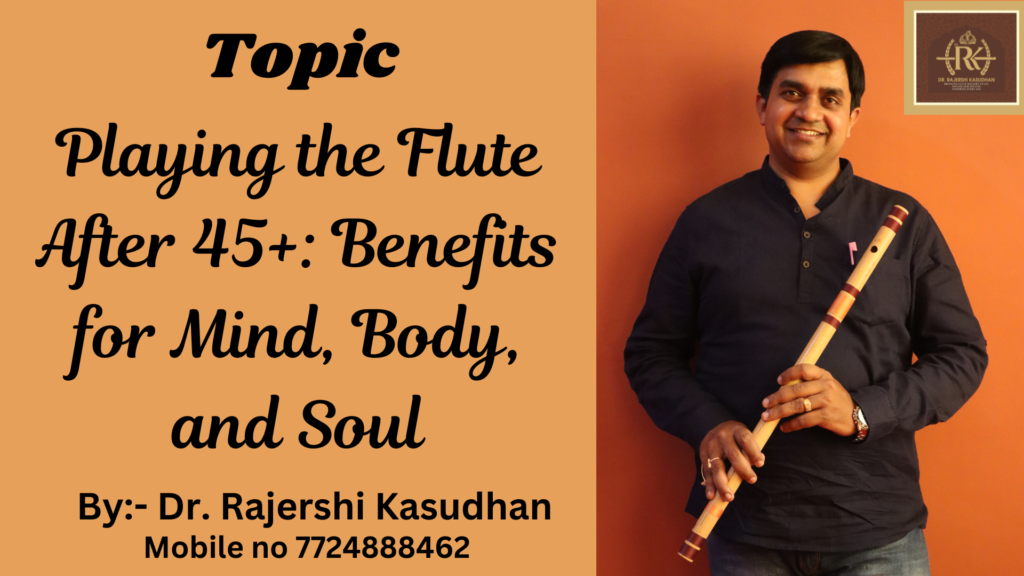Playing the Flute After 45+: Benefits for Mind, Body, and Soul
Learning to play the flute after turning 45+ can be a fun new hobby that also helps you stay healthy and happy. When older adults start playing the flute, they can improve their thinking skills, breathe better, and feel more joyful. Playing the flute involves learning new things, which keeps the brain active, and the act of playing helps keep the body strong and agile. Plus, making music can be a relaxing and enjoyable way to spend time.

Key benefits of learning to play the flute after the age of 45, expanding on how these can specifically impact an older adult’s life:
Cognitive Benefits
As we age, engaging in new learning experiences is crucial for maintaining cognitive health. Playing the flute involves multiple aspects of cognitive function:
- Memory: You’ll need to memorize music and finger positions.
- Concentration: Playing music requires sustained focus, which can improve your overall attention span.
- Pattern recognition: Music is inherently about recognizing patterns, and learning to interpret these can enhance your cognitive flexibility.
Physical Health
Physical health can be particularly improved by playing wind instruments:
- Lung health and breathing control: Wind instruments like the flute require control over breathing, which can strengthen the diaphragm and improve overall respiratory function.
- Fine motor skills: Managing the keys of a flute demands precision, which is excellent for maintaining and improving fine motor skills.
Emotional Well-being
Music has a unique way of touching our emotions:
- Expressiveness: The flute can produce a range of emotional tones, from melancholy to joyous, allowing a personal expression that might be more difficult to articulate in words.
- Therapeutic effects: The act of playing music can be meditative and therapeutic, helping to manage emotions and alleviate symptoms of depression or loneliness.
Social Interaction
Joining music groups can significantly enhance one’s social life:
- Community involvement: Whether it’s joining a local music group or participating in classes, these activities provide a sense of belonging and community.
- Shared experiences: Making music with others can lead to meaningful connections and shared joy, which are important for emotional health.
Stress Relief
The act of playing an instrument can be a powerful stress reliever:
- Mindfulness: Playing the flute requires present-moment awareness, similar to mindfulness practices, which can reduce stress levels.
- Distraction: Engaging deeply in playing can distract from daily worries and act as a stress outlet.
Lifelong Learning and Curiosity
Keeping the mind engaged with new learning is vital as we age:
- Mental agility: Learning something new like flute playing challenges the brain, keeping it agile and engaged.
- Curiosity: Exploring music can lead to discovering new genres, composers, and cultures, feeding and stimulating curiosity.
Cultural Engagement
Music opens up a window to different cultures and histories:
- Cultural appreciation: Each piece of music provides insight into the culture from which it originated.
- Historical context: Learning about the pieces you play can also teach you about the history surrounding the music, enriching your understanding of the past.
Personal Fulfilment
Personal goals in music can bring profound satisfaction:
- Achievement: Mastering a new song or technique can provide a significant sense of achievement and pride.
- Personal challenge: Setting and meeting personal challenges in music can be very fulfilling and can boost self-confidence.
Conclusion
This study examines the multifaceted benefits of playing the flute for individuals over the age of 45+, highlighting cognitive, physical, and emotional enhancements. Engaging in flute playing can bolster cognitive functions through activities that require reading music, memorizing sequences, and executing precise finger movements, which enhance memory, attention, and executive functions. Physically, flute playing demands controlled breathing and fine motor skills, which are instrumental in improving respiratory function, core strength, and hand-eye coordination, crucial for maintaining physical health in the elderly.
Emotionally, the therapeutic aspects of flute playing, including stress reduction and the expression of feelings, can significantly alleviate symptoms of depression and loneliness. Furthermore, participating in flute-based musical groups offers social interaction opportunities that reduce social isolation and enhance community connectivity, ultimately improving life satisfaction. Collectively, these benefits underscore the importance of incorporating flute playing into recreational and therapeutic programs for older adults, promoting their cognitive, physical, and emotional well-being.

